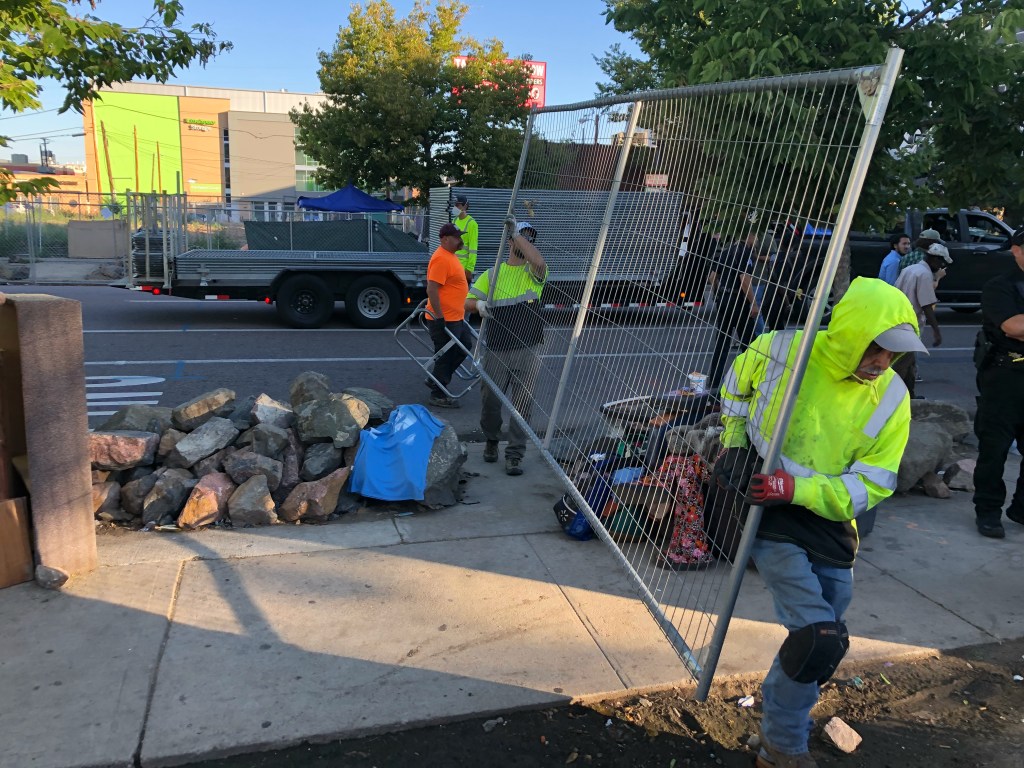
First homeless encampment sweep underway authorized by Denver Mayor Mike Johnston

City crews Friday morning began the first homeless encampment sweep authorized by Denver Mayor Mike Johnston.
The dozens of people living in tents and makeshift shelters along the 2200 block of Stout Street are being moved along without being offered housing options beyond the city’s existing homeless shelter system.
Johnston, elected in June after campaigning on a promise of ending unsheltered homelessness in his first term in office, has said that his policy toward sweeps — a common action under previous Mayor Michael Hancock — is to avoid them until more stable housing like a hotel room, tiny home or Safe Outdoor Space tent can be secured for all the inhabitants of an encampment.
He said he knows sweeps without housing are not a solution to homelessness “because it means you’re chasing people off one block and then end up on another block.”
Unsheltered homelessness rose by 8% in Denver in 2023 over 2022, according to a recently released point-in-time count. That despite the Hancock administration conducting sweeps on a regular basis.
Some residents have criticized Johnston’s approach, arguing the sweeps are the only enforcement tool the city has that gives them relief from people illegally camping in front of their homes and businesses.
In this case, cleanup was necessary even without that housing available because a rodent infestation was found in the encampment, Johnston said at a news conference Wednesday. The mayor had previously outlined that under his administration’s approach, encampments would only be swept without housing to offer if they present a threat to public health or safety, are blocking a public right of way or the encampment is infringing on private property.
The Stout Street camp spans the entire block with tents pitched on both sides of the street, even between large rocks and among fences apparently put in place to deter camping. The area is near many of the city’s homeless shelters and homeless service providers.
Johnston personally visited the camp Thursday asking residents about any help they might need and making sure city officials had residents’ information so they could attempt to reach people when more housing becomes available. The city last week announced that it will be leasing a 194-room hotel from the Denver Housing Authority to open as a homeless shelter before the end of the year.
“We’ve been really focusing on how we engage them in a conversation on what the long-term housing options are,” Johnston said Wednesday of the Stout Street camp. “So we both sent them a letter as well as have been doing ongoing outreach about the opportunities for housing that will be coming through as part of our effort to get 1,000 people off of the streets and into shelter.”
Johnston announced his goal to offer 1,000 people living on the city’s streets access to shelter before the end of the year last month as his first news conference as mayor. He has declared homelessness an emergency in the city, a step meant to open up more state and possibly federal resources and cut through red tape that may slow down housing acquisition.
Johnston said his administration asked the nonprofit public health organization Headwaters Protectors to visit the Stout Street encampment and help with outreach efforts.
Ean Thomas Tafoya, the former mayoral candidate who founded that group, said his organization likely would have visited the encampment on Sunday anyway. The group is focused on improving health conditions in encampments. Volunteers provide water, sanitary products like soap and toothbrushes, tools like rakes and shovels that help residents take care of their spaces, drug testing strips and other items to make living on the street more humane, regularly visiting large encampments on Sundays.
Tafoya said encampments have existed in and around the 2200 block of Stout Street for years, and his organization has offered its services to people there many times. He’s heartened by the fact that the Johnston administration recently launched trash collection services for two encampments. He would like to see that expanded. Oftentimes, encampments have excess trash because people who think they are helping bring food items that require refrigeration to the camps and the residents there have no way to preserve or dispose of those items, Tafoya said.
“It’s unfortunate that this situation exists with the rats but it’s because public health wasn’t being provided for,” Tafoya said.
Tafoya emphasized he does not support the sweep on Stout Street or any sweep. He calls them traumatic displacements.





